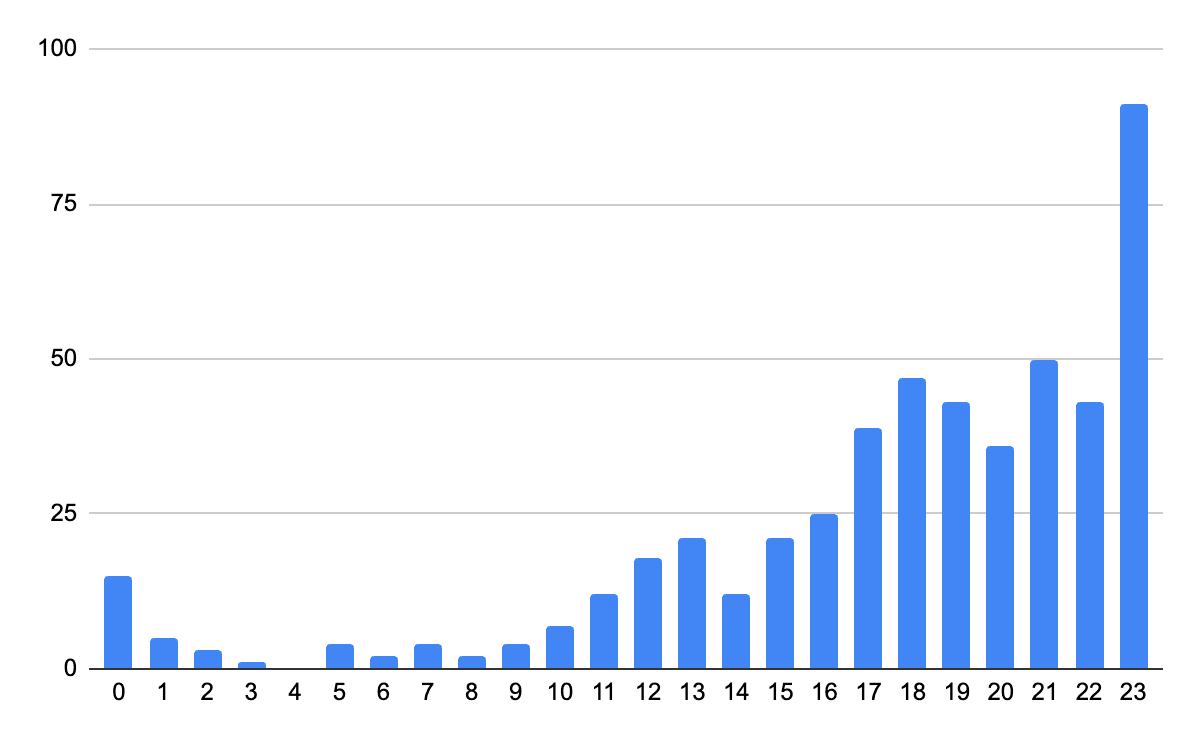Published on November 13, 2025 7:48 AM GMT
If you don't know, Inkhaven is a residency where you come and publish a blogpost every day. No "Oh it would be nice to blog some day" or "Oh I'm working on something, I'm sure I'll publish it some day". No, you have to publish today, otherwise you are asked to leave.
After 10 days into the first ever Inkhaven cohort, here are some questions I have.
1. Is daily the right cadence?
Everyone has been posting daily. There are many amazing things about this. Everyone is actually creating, there is nobody here who talks the talk but doesn't walk the walk.
The posts are actually getting people's souls into them. I don't claim every post is someone's best work, but I like most posts I read and I think the person is really trying to do something good.
However, there is a wide variety in how proud people feel about their writing.

I also asked people how satisfied they are with what they're doing, versus those who want to make a drastic change

That's 5 people at 3/10, toward the end of "1 = I need to make a drastic change to what I'm doing".
Several fiction-writers have told me that they need a few days to work on a story, which is why they're writing non-fiction here. And it is often the case that people cut off ideas early in order to publish, rather than letting them expand and develop, or do more research on them.
However, there are real skills being practiced here, and good blogposts being written. People are learning the skill of having an idea and shipping it same-day. I am confident that a lot of these people will take a blogging skill with them.
Nonetheless, I think that some version of this commitment can be extended to other time-scales.
What might a 'Weekhaven' look like?
- Each week, you write a single, 3,500+ word effortpostWriters could spend whole days reading and doing research, without writing.It would have more narrative arc to the week. Currently an idea is brought up today, discussed, and published same day. In Weekhaven, they'd get feedback on it multiple times at different levels of development.Editing would be more of a process; you could take a finished essay and restructure it, or re-write whole sections.
2. How do I better connect residents with established writers?
I invited a lot of the established writers here to give advice but with relatively little structure.
This is partly overdetermined by the general framing of the event, which is that nothing is mandatory except daily publishing.
In contrast, during the 6-week prestige Clarion Fiction workshop, you spend 9am to 12 noon in feedback circles, discussing the fiction by your peers, every day. And one of the established writers leads it and asks the questions.
I think there are problems with that way of doing things, but it does ensure that everyone actually finds out how their piece lands with other people and absorbs taste and feedback from the established writer.
I can't do this at Inkhaven! I sorted everyone into 5-person feedback circles on Day 2 and ~half didn't go. There's a daily sign-up, yet most days not a single one happens. I think people are wrong about how much feedback they should be having, but I cannot make them do the thing. The lack of mandated activities partly means I'm now left doing environmental optimization. If I put talks outside in the central courtyard straight after lunch, or the office hours on the central deck, then people are more likely to try it out by listening in for a while.
Also, learning from the advisors isn't primary. The writers can share tricks of the trade, but blogging is typically a very personal expression of one's soul and should not primarily be imitated. The contributing writers are there to help hone the expression of the soul.
That said, I'd say that for essentially all the established writers, they are hanging around and having casual chats more than half of the time.
Ways I could go:
- This is fine, all the writers I brought here are enjoying themselves.Their time isn't being well used, we should have them around way less.I should find a clever way to cause them to read the residents' writing more and for the residents to get more feedback / advice / input.
3. Should I be getting people to relax & do more downtime things?
Everyone is writing until really late, then the ratchet starts again the next day.
From yesterday's post, here's the graph of what hour people are publishing.

This means that people are basically busy all evening, and aren't doing fun things together. There's almost no board game nights or reliable evening events, because most people can't reliably be there, and they're stressing out until ~midnight.
Now, you might think "Why not bring the deadline back to like 8pm, so that people have the night off?". But that's kind of antithetical to what Inkhaven is here to offer. Should I just cut out 4 hours of their day where they can't write? I assure you, they wouldn't spend the late hours precociously working on tomorrow's stuff. They selected into being the kind of people who needed an externally imposed deadline to get stuff done. They'd just be losing a good chunk of writing each day.
I just chatted with a visiting artist, and their take was not to try to incentivize this not happening, just to make a better ritual of it. Have people cheer and applaud at the moment of hitting publication. I like that idea, might try more of it.
Anyway, I think at a minimum, I need to help people stay embodied and get enough sleep. We're bringing in a masseuse and I'll think about some exercise stuff to do.
4. How do I help readers find signal in the noise?
We're going to produce about 41 * 30 = 1,230 blogposts over the month of November.
I think they're generally pretty good. Interesting ideas, some nice choice of phrasing, real soul in a lot of them.
Now, most people shouldn't just be doing a random sampling, they should be sent to some posts that give them something they're looking for.
However, the naive way, which is to just list some of the "best" ones, puts some things on an axis of goodness, which isn't what I want to happen here. The things happening are more incommensurable than that.
One person I know writes extremely funny semi-fictional freudian psychoanalyses of himself. One person writes practical advice about statistics. One person has written C.S. Lewis fan-fiction of the Screwtape Letters. One person has done a replication of a very popular psychology study (that did not replicate!). One person is writing a sequence of analysis of how language works on a group level, how it constrains and coordinates action.
These are the more successful things, but many people are trying experimental things that are niche or strange. There's not a single axis of what counts as 'good' here, of 'quality'. Any way of highlighting things must steer clear of that.
I think the best ideas for now are for me to (a) encourage established writers to link to some pieces that they resonate with from their blogs, and (b) highlight things in different genres on the website. But I am not sure how to do this without having read everything (and having the established writers read everything).
I suspect there's some way to get the residents to do a substantial amount of reading and highlighting, but I haven't come up with a proposal I like yet.
5. What kind of podcast or video footage should I record here?
I have a lot of high-quality recording equipment. Here's an example where Patio11 recorded a podcast here with my boss.
I have a lot of interesting people about. Should I do interviews? Have them read their blogposts and discuss them? Make an Inkhaven YouTube channel? Make a documentary?
We've got a few interesting interviews on a theme, where Adam Mastroianni interviews people like Aella and Slime Mold Time Mold and GeneSmith about where the ideas for their blogposts come from. I'll probably find a way to release those.
6. Can I make more money with Inkhaven?
So far I am making some money from the paying residents (many have needed financial support to be able to be part of this program), and from sponsorships (thank you WordPress.com for your generous support of the program!). Nonetheless it's still in the red at the current time, by somewhere in the $50k–$100k range.
This is substantially due to the opportunity cost of not running lots of weekend conferences at Lighthaven in November.
I think the obvious thing is to try harder to figure out whether we can take conferences in that period. We're currently accepting one, we'll see how annoying it is to move all the residents out of their rooms, but of course there's definitely prices that make it worth it.
Natural options:
- Charge moreSell more resident spotsGet more sponsorsGet more weekend conferencesHave fewer staff (currently 5 full-time coaches and one full-time ops person)
My plan is to work on 3 & 4. I also suspect that after doing it once, it'll be a more known quantity, and demand will go up next time (2). 1 and 5 seem bad.
Of course, if none of these work out, then it's up to our broad support base of donors to decide if this thing is worth supporting in the non-profit sector.
7. How long should Inkhaven run?
We did the month of November for two reasons:
- It is the same as NaNoWriMo, which was an inspirationWe could make it work with the calendar of Lighthaven
Here are some reasons to change:
- Not everyone has the same month free. Perhaps if we let people pick a single month in the summer, they can pick the time that works for them.Perhaps people should do different lengths? 3 weeks of daily publishing, then 3 weeks of weekly publishing, then 3 weeks working on a single essay.
The relevant variables are how much value is there from starting simultaneously; and whether people will burn out from doing it for more than a month.
I will know more about burnout after 30 days; I'm writing on day 12.
8. Should I have more mandatory stuff? More structure?
These are the sorts of people who have self-selected into a program that puts strong external demands on them in order to produce creative/intellectual outputs. Perhaps there are other things that would be worth me mandating?
- Getting more painful & scary feedback from their peersGetting more painful & scary feedback from established writersDoing an editing class
I have a sense that there may be something else in this space, but I'm not convinced of anything in-particular currently.

Discuss

